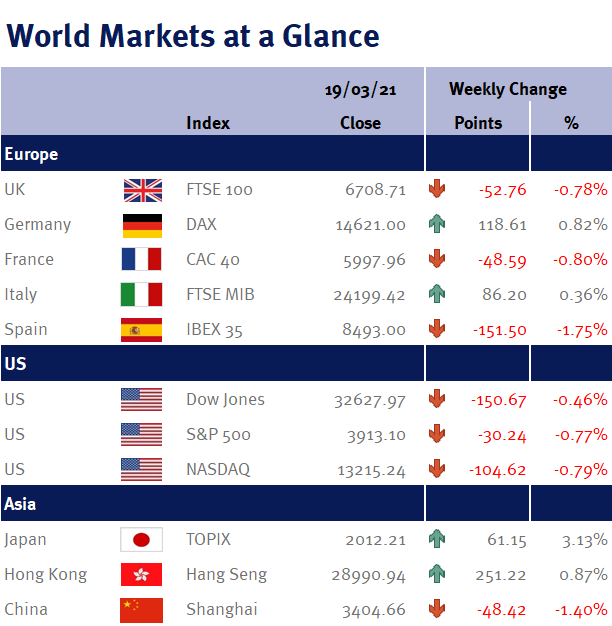On the surface, the Fed was very dovish: it upgraded its economic growth forecasts (to 6.5% for 2021; 3.3% in 2022; and 2.2% in 2023); it forecast that unemployment would fall sharply (to 4.5% in 2021; 3.9% in 2022; and 3.5% in 2023); and believes core CPI inflation will run around its 2% target (2.2% in 2021; 2% in 2022; and 2.1% in 2023).
Furthermore, the Fed Chair, Jay Powell, not only said that a transitory rise in inflation is not a reason to increase interest rates, but that the US central bank won’t act on forecasts and instead will now wait for actual data for confirmation that the economy has achieved its dual goal of 2% inflation and full employment before tightening monetary policy – and as a consequence, the Fed indicated that US interest rates will stay unchanged until at least 2024.
However, on further investigation the Fed’s ‘dot-plot’ (which shows each policymaker’s interest rate forecast for each of the next three years), indicated that four of the 18 policymakers are forecasting an interest rate increase next year, while seven of the 18 see at least one increase in 2023, suggesting they think the recovery will be even stronger.
While we can see that the US economy is clearly improving, we believe a full recovery will take more than a year or two – it took nearly 10 years to recover from the 2008/9 global financial crisis. And this week’s jobless claims data indicated that momentum in the labour market recovery is slowing – and if unemployment levels remain well above the pre-coronavirus outbreak levels, economic slack will remain elevated, which of course will restrict wage growth (and therefore inflation).
However, unfortunately this dot-plot forecast may mean that the current tug of war between economic stimulus and an economic reopening on one side and higher inflation and interest rates on the other is likely to continue, which unfortunately means we could see occasional periods of mispricing and volatility in both bond and equity markets.
Nevertheless, overall this Fed statement was very positive for equity markets as it suggests to us that the majority of policymakers have learned from their the recent mistake of acting prematurely by increasing interest rates on overly optimistic growth and inflation forecasts.
It was a similar message for the BoE.
However, what was interesting to us was the fact that there was absolutely no mention of negative interest rates.
Negative interest rates were of course the main focus of last month’s BoE meeting – and we had hoped that now Mark Carney (aka ‘the unreliable boyfriend’) is no longer the BoE Governor, the flip-flopping messages coming out of the BoE would stop: what has happened in the past month to not even mention negative interest rates?
While we fully appreciate Joe Biden’s $1.9tr US fiscal stimulus package has been passed during the month, to us, as soon as the Democrats took control of both houses of Congress and the White House in January, it became a fait accompli that this fiscal stimulus bill would be passed. Moreover, the UK is still tackling new Brexit rules and fresh lockdown restrictions across Europe.
Furthermore, this week saw the price of a barrel of Brent oil fall over 7% (thanks to a mix of European lockdowns; a downbeat outlook from the International Energy Agency (IEA); and news that China has been buying record amounts of Iranian oil). And a lower oil price will help ease inflationary pressures.
Looking at the week ahead, we have PMI data for the US, UK and Eurozone; UK employment data (unemployment rate and weekly earnings); UK CPI inflation; UK retail sales; weekly US jobless claims; Chicago Fed National Activity Index; US durable goods orders; and the Fed’s preferred inflation measure, the PCE.
Investment Management Team


